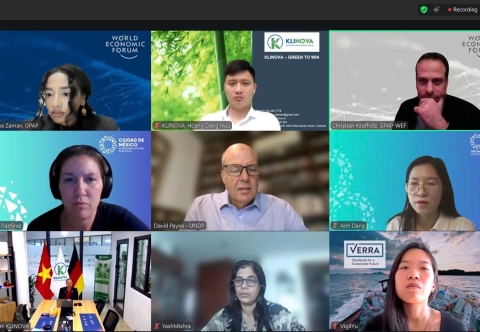In the context of Vietnam’s rapidly growing economy, with digital transformation and green development becoming key pillars, the issue of collateral at credit institutions has attracted increasing attention. Specifically, the establishment of the legal status for non-traditional assets, such as digital assets and carbon credits, in banking activities presents many challenges and urgent requirements. In response to this practical demand, the Vietnam Banking Times organized the seminar “Bank Collateral – Current Issues of Concern,” aimed at clarifying emerging issues, sharing international experiences, and providing guidance on building a legal framework suitable for Vietnam’s context.
This morning, on April 28, in Hanoi, the seminar “Bank Collateral – Current Issues of Concern” was held by the Vietnam Banking Times, with the participation of nearly 100 delegates, including policymakers, both domestic and international experts, representatives from financial institutions, banks, legal experts, and specialists in digital transformation and green transition. The seminar was chaired by Ms. Lê Thị Thúy Sen, Editor-in-Chief of the Vietnam Banking Times, along with the participation of Prof. Dr. Bùi Đình Thọ, Vice Director of the Institute of Strategy, Policies, and Environment (Ministry of Agriculture and Environment), and other renowned speakers and scholars.
In her opening speech, Ms. Lê Thị Thúy Sen emphasized that as Vietnam’s economy transforms towards green and digital growth, developing new types of collateral such as digital assets and carbon credits not only helps diversify collateral sources for the banking system but also plays a key role in promoting economic growth and increasing capital flows, which in turn supports green transition and sustainable development. She also posed the critical question: how can these new assets be recognized and used as collateral for loans at Vietnamese banks? The seminar was organized to create a deep forum that connects theory with practice, exchanging international experiences with Vietnam’s internal needs, and proposing solutions for building a suitable legal framework.
.png)
In the presentations, experts analyzed the current legal framework related to collateral in Vietnam, pointing out that the Civil Code of 2015 and Decree 21/2021/ND-CP do not yet directly regulate digital assets and carbon credits (according to Dr. Lê Thị Giang, Hanoi Law University). However, there are indirect legal grounds that open up the possibility of recognizing these non-traditional assets. The presentations all highlighted the great potential of digital assets and carbon credits in supplementing collateral sources for the banking system and proposed that regulations on registration, storage, valuation, and handling of these new assets should be quickly developed, in line with international standards. According to Dr. Vũ Thị Vân An (Senior Manager, ESG Department - KPMG Vietnam), experiences from countries such as the EU, Brazil, and Thailand show that proactively establishing a legal framework for non-traditional assets not only boosts the financial market but also strongly supports the green transition and sustainable development.
The seminar’s discussion session became a lively forum, where delegates extensively exchanged views on practical issues related to the recognition of digital assets and carbon credits as collateral. Contributions from both businesses and experts focused on several important points.
Assoc. Prof. Dr. Bùi Đình Thọ, Vice Director of the Institute of Strategy, Policies, and Environment (Ministry of Natural Resources and Environment), provided an important insight into the potential of carbon credits (CCs) in Vietnam and the necessity of building clear and specific legal regulations for digital assets and carbon credits. According to Mr. Thọ, since 2014, with the support of the World Bank, Vietnam has begun trading carbon credits in the market. This demonstrates the significant potential of carbon credits in Vietnam, especially from sectors like agriculture, forestry, and renewable energy. Mr. Thọ emphasized that these resources could generate a substantial amount of carbon credits, which would significantly contribute to reducing emissions and promoting green transition.
.png)
However, he also pointed out that in order for carbon credits to fully realize their potential in becoming bank collateral, comprehensive and specific legal regulations for digital assets and carbon credits must be established as soon as possible. This would help businesses, credit institutions, and banks easily transact and utilize these assets in financial activities, opening up new opportunities for promoting sustainable credit and developing the green economy.
Several business representatives suggested that Vietnam needs to have a clear strategy and invest heavily in technology solutions to ensure that digital assets can be traded effectively and securely. Startups and large tech companies also expressed their desire to participate in the process of developing technological infrastructure to build a solid foundation for trading digital assets in the future. At the same time, businesses and credit institutions hope that new policies will soon create opportunities to leverage the potential of digital assets and carbon credits in loan activities, contributing to promoting sustainable credit and developing the green financial market.
.png)
The seminar “Bank Collateral – Current Issues of Concern” has created a forum connecting theory with practice, opening up research directions to build a modern legal system in line with international standards. This is an important step in preparing a solid legal framework for applying digital assets and carbon credits as collateral, helping to overcome long-standing challenges on this topic, and contributing to promoting the green economy, digital economy, and sustainable development in the near future.
 Meeting to propose the implementation of the Letter of Intent for the National Green Carbon Action Partnership Program (NBCAP)
Meeting to propose the implementation of the Letter of Intent for the National Green Carbon Action Partnership Program (NBCAP)
 Online Workshop on the Financing Roadmap for Plastic Action to 2030: Mobilizing USD 8.5 Billion for Viet Nam’s Circular Economy
Online Workshop on the Financing Roadmap for Plastic Action to 2030: Mobilizing USD 8.5 Billion for Viet Nam’s Circular Economy